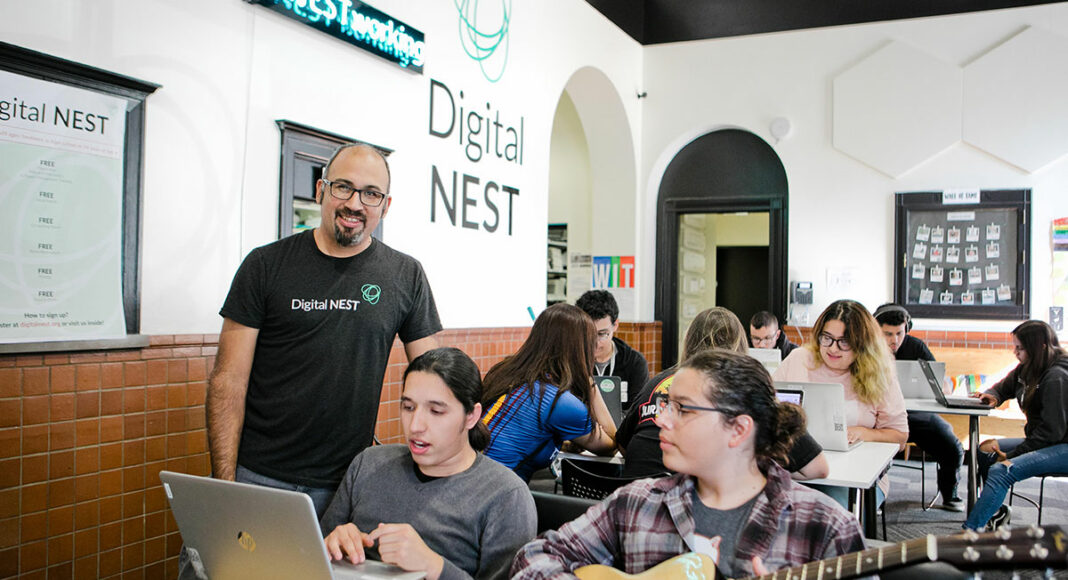It took all of 48 hours for Digital NEST to move all of its courses, business and employees to a state-of-the-art online platform.
Other local companies, institutions and businesses were not as prepared to be shoved into the work-from-home, online-only era caused by the Covid-19 pandemic.
“We quickly realized that there would be a big need for us,” says Digital NEST Executive Director and Founder Jacob Martinez.
Since Santa Cruz County officials ordered residents to shelter-in-place in mid-March, Digital NEST (which stands for Nurturing Entrepreneurial Skills with Technology) has worked to fill the gaps created by the shutdown.
Their quick online transition allowed the nonprofit to give its dozens of young members (16-23 years old) an outlet and creative space while they were stuck at home. Martinez and Deputy Director Steve Bean also urged their members to get out into the community to help solve the problems that arise during trying times such as the pandemic.
That, Martinez says, led to the creation of NESTcorps, a budding group of volunteers that has created solutions to many of the unexpected issues attributed to the shutdown.
Some volunteers created a YouTube channel in which they post videos of themselves reading children’s books to help some of the parents of Pajaro Valley Unified School District students that have had to play both parent and teacher. Another group of volunteers helped film and bring attention to the ongoing Campesino Caravan of Appreciation that honors and informs local farmworkers each week at fields throughout the Pajaro Valley.
“It’s great to see our young people that could’ve easily sat back at this time, and checked out and just been on TV or playing video games or social media, but here is a group of 25 youth that said, ‘No, we’re going to help solve some of the problems in our community,’” Martinez says. “That’s the type of youth that Digital NEST is helping to grow.”
Along with NESTcorps, Digital NEST started a computer loan program that distributed 50 laptops (40 in Watsonville and 10 in Salinas) to high school and college students in need of proper equipment for remote learning. NESTaid, a food security program that raises money for families of NEST members in need, got off the ground following the shutdown.
It has also produced several digital projects for local agencies and businesses. Martinez highlighted a Spanish and Mixteco public service announcement about Covid-19 created for Salud Para La Gente that has been shared thousands of times.
Additionally, it is in the process of creating an online directory for small businesses that are still open during the shutdown but lack a website to inform their customers. Santa Cruz tech company Looker, a Google company, is helping Digital NEST piece together the project.
“We’ve been busier than ever,” Martinez says. “In many ways, this time has proved that having a Digital NEST in your community during these times is essential.”
Martinez says Digital NEST is defined as an “educational center” under the county’s shelter-in-place order, meaning it could reinstate in-person courses with certain restrictions—no groups larger than 12 and no mixing of groups or instructors.
He said they would not rush to return to their brick-and-mortar location abutting Cabrillo College’s Watsonville Center—it also has a location in Salinas—but understood their in-person courses were vital to the community’s young people.
“We want to make sure we’re safe for our youth and safe for our staff,” he says. “Our enrollment is holding strong …. We’re doing good, but, at the same time, for a lot of our youth, the NEST was that place where they escaped home—it was their safe space…. We’re weighing the mental health of our young people. They need us. They need the space.”














